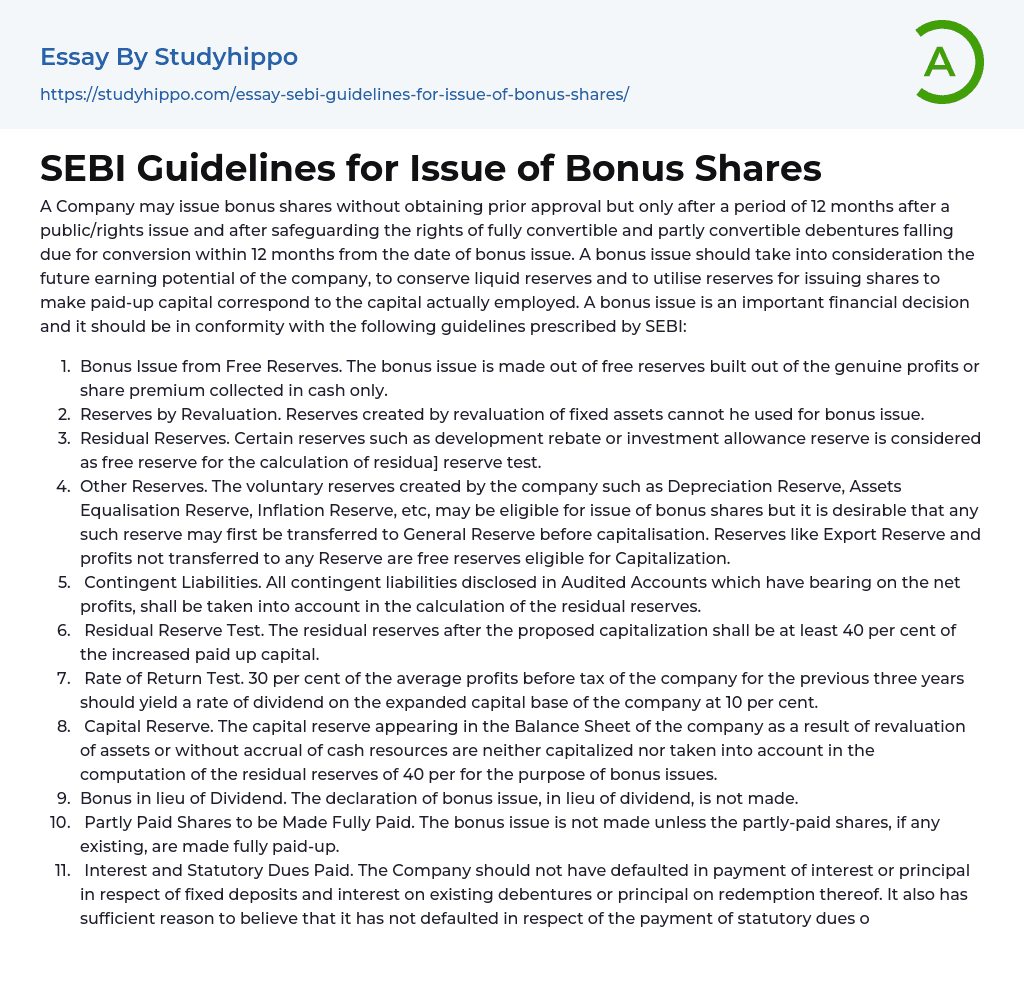The Company has the ability to issue bonus shares without prior approval, but only after 12 months following a public/rights issue. This must be done while safeguarding the rights of fully convertible and partly convertible debentures that are due for conversion within the same 12-month period. When issuing bonus shares, it is important for the Company to consider its future earning potential, conserve liquid reserves, and utilize reserves to ensure that the paid-up capital corresponds to the actual capital employed. The Securities and Exchange Board of India (SEBI) has prescribed guidelines that must be followed for a bonus issue. These guidelines include:
1. The bonus issue must come from free reserves, which are generated from genuine profits or cash collected as share premium.
2. Reserves created through revaluation of fixed assets cannot be used for a bonus issue.
3. Certain reserves, such as development rebate
or investment allowance reserve, can be considered as free reserves for calculating residual reserve.
4. Voluntary reserves created by the company, such as Depreciation Reserve, Assets Equalisation Reserve, Inflation Reserve, etc., may be eligible for issuing bonus shares but it is recommended that they first be transferred to the General Reserve before capitalization.Reserves such as Export Reserve and profits that haven't been transferred to any Reserve are considered free reserves, making them eligible for capitalization. Additionally, any contingent liabilities that are disclosed in Audited Accounts and have an impact on net profits will be included in the calculation of residual reserves. Lastly, the Residual Reserve Test applies.
The residual reserves after the proposed capitalization must be at least 40% of the increased paid up capital.
a return of 10% on 30% of the average profits before tax for the previous three years.
The Company should not have defaulted in payment of interest or principal in respect of fixed deposits and interest on existing debentures or principal on redemption thereof. It also has sufficient reason to believe that it has not defaulted in respect of the payment of statutory dues of the employees such as contribution to provident fund, gratuity, bonus etc.
The company should include provisions in its Article of Association for capitalization of reserves. If these provisions are not already present, the company must pass a Resolution at its General Body Meeting to add them.
In the case that the subscribed and paid up capital exceeds the authorized share capital after a bonus issue, the company must pass a Resolution at its General Body Meeting to increase the authorized capital.
No bonus issue will dilute the value of fully convertible and partly convertible debentures. Additionally, a company planning to issue bonus shares must provide certification that the terms and conditions for issuing these shares, as outlined in SEBI's guidelines from April 13, 1994 (which modify earlier guidelines from June 11, 1992), have been complied with. This certification must be countersigned by the company's auditors or a practicing company secretary. The certificate should be submitted to SEBI before the issue occurs, and an acknowledgement must be obtained from SEBI.
- Accounting essays
- Marketing essays
- Automation essays
- Business Cycle essays
- Business Model essays
- Business Operations essays
- Business Software essays
- Corporate Social Responsibility essays
- Infrastructure essays
- Logistics essays
- Manufacturing essays
- Multinational Corporation essays
- Richard Branson essays
- Small Business essays
- Cooperative essays
- Family Business essays
- Human Resource Management essays
- Sales essays
- Market essays
- Online Shopping essays
- Selling essays
- Strategy essays
- Management essays
- Franchising essays
- Quality Assurance essays
- Business Intelligence essays
- Corporation essays
- Stock essays
- Shopping Mall essays
- Harvard Business School essays
- Harvard university essays
- Trade Union essays
- Cooperation essays
- News Media essays
- Waste essays
- Andrew Carnegie essays
- Inventory essays
- Customer Relationship Management essays
- Structure essays
- Starting a Business essays
- Accounts Receivable essays
- Auditor's Report essays
- Balance Sheet essays
- Costs essays
- Financial Audit essays
- International Financial Reporting Standards essays
- Tax essays
- Accountability essays
- Cash essays
- Principal essays




